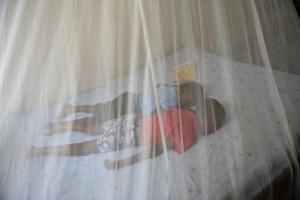Ghana intensifies efforts towards malaria elimination
Accra – Charity Damoah, 36, lost count of the number of times she was admitted to hospital with malaria while growing up in Sunyani, in Ghana’s Bono region. But things are different now for her two-year-old son John.
Unlike the many other Ghanaians who had lived daily with the threat of the disease, he has never had malaria.
“Over the years, malaria has affected everyone in my family, with some even dying as a result. Now, when you are pregnant, you receive malaria medicines and mosquito nets. And the children also receive medicines or vaccines to protect them from malaria. So I am happy for my son and other children because this is not something we had when we were growing up,” says Damoah.
Gertrude Anno from Assin Fosu in Ghana’s Central region concurs with Damoah as her two children have not suffered from malaria like she did while growing up in a region with one of the highest burden of malaria in the country.
“All the things that health workers have been doing have helped to protect my children from malaria. For my son Kwesi, he is even lucky to have received the malaria vaccination and so he has been very healthy,” added Anno.
In 2018, Ghana was among Africa’s 10 high-burden malaria countries to benefit from the High Burden High Impact (HBHI) approach. With support from World Health Organization (WHO) and the RBM Partnership to End Malaria, Ghana undertook the HBHI approach, which is a targeted mechanism of activities and interventions for effective malaria control, towards elimination of the disease.
The approach has enabled Ghana to adopt tailored measures and optimize the use of existing tools for the reduction of malaria-related deaths.
The country has managed to reduce the rates of malaria parasite prevalence in children younger than five, from 20.6% in 2016, to 8.6% by 2023 according to the Ghana Demographic Health Survey. The combined use of vaccines, distribution of long-lasting insecticide-treated mosquito nets and other strategies also resulted in a reduction of in-patient audited malaria deaths, from 428 in 2018, to 155 in 2022.
The changing face of the malaria burden in Ghana is attributable to the implementation of robust national malaria control efforts, including seasonal malaria chemoprevention, indoor residual spraying, and intermittent preventive treatment.
In addition, as of September 2023, a total of 2.2 million doses of the world’s first malaria vaccine, RTS,S/AS01, had been administered to 708 970 eligible children in seven of Ghana’s 16 regions.
WHO’s support for Ghana’s malaria control efforts has included training and monitoring of malaria preventive measures, including seasonal malaria chemoprevention and malaria vaccines. The Organization also supported the strengthening of malaria surveillance, monitoring and evaluation, including malaria risk stratification.
“The data shows that our strategy against malaria has been effective. We will continue to work with partners to ensure that we build on this momentum to consolidate the gains towards malaria elimination in Ghana,” says Dr Keziah L. Malm, the Ghana National Malaria Elimination Programme Manager.
The most recent boost for Ghana’s malaria efforts was the launch of the National Malaria Strategic Elimination Plan 2024–2028, a blueprint to accelerate progress towards malaria elimination.
Dr Frank Lule, Acting WHO Representative in Ghana, attributes the progress against malaria to the multi-pronged strategy.
“The use of indoor residual spraying, treated mosquito nets and now the malaria vaccine, has strengthened Ghana’s malaria control toolbox and is beginning to show dividends,” he noted.
The multi-strategy response also ensures the advancement of health and gender equity, and human rights, with vulnerable populations being prioritized. All malaria preventive and chemopreventive interventions in Ghana are free for children younger than five and pregnant women. Children of all ages have also benefited from the distribution of long-lasting insecticide-treated bednets (LLINs), offering protection to families from malaria-causing mosquitos.
“Ghana’s approach to the fight against malaria has been anchored on leaving no one behind. We continue to actively provide technical support to the country’s efforts to protect the most vulnerable from the threats of malaria,” noted Dr Felicia Owusu-Antwi, National Professional Officer for Malaria, Vector-Born and Neglected Tropical Diseases.
For mothers like Damoah and Anno, Ghana’s efforts against malaria has also reflected in their improved knowledge of malaria preventive measures, which they believe has been key to protecting their families.
“Now, I regularly sleep under treated mosquito nets with my children and whilst also ensuring that environment does not breed mosquitos,” says Damoah. “I encourage every parent to follow all the advice of the health workers to protect their families”.
The Africa region continues to shoulder the highest burden of malaria globally, accounting for 94% of all malaria cases (233 million) and 95% of all malaria deaths (580 000) in 2022.
With the recent certification of Cabo Verde as malaria-free, and Ghana’s progress towards elimination, there is cause for optimism, says Dr Dorothy Achu, Team Lead for Tropical and Vector-Born Diseases at WHO Africa, noting that these achievements reflect strengthened malaria control efforts regionally.
“Cabo Verde and Ghana have demonstrated that sustained commitment is key to the malaria control agenda. In line with our commitment to Ending disease in Africa, WHO will continue to support the maintenance and scale-up of malaria control interventions across the region,” she says.
